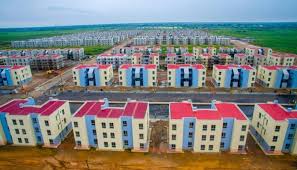Bright Simons Unpacks ‘Katanomic’ Failures Behind Saglemi Housing Debacle
Public policy analyst and Vice President of IMANI Africa, Bright Simons, has described the Saglemi Housing Project as a classic example of “katanomic” governance—a term he uses to depict policy incoherence and political expediency overriding sound decision-making.
In a detailed analysis published on social media, Mr Simons criticised successive Ghanaian governments for mishandling the $200 million Saglemi Affordable Housing Project, launched in 2012, which has now become the subject of international arbitration and mounting financial liabilities.
The project, initiated under the Mahama administration, saw Ghana borrow $200 million from Credit Suisse at an annual interest rate of 12.5%. About $180 million of this amount was transferred to Construtora OAS Ghana, a local subsidiary of Brazilian construction firm Construtora OAS, to construct 5,000 affordable housing units.
However, only 1,506 units were completed—none of which are habitable. According to Mr Simons, the properties lack essential infrastructure such as water, electricity, and drainage. Making the units livable, he added, would require an additional investment of over $115 million—bringing the average cost per unit to an estimated $200,000, far exceeding any reasonable definition of “affordable housing.”
Political Transitions and Legal Quagmires
Following a change in government in 2017, authorities initiated criminal proceedings against two former ministers and three other individuals over alleged financial mismanagement and illegal contractual amendments. Mr Simons notes that these prosecutions were based on the premise that only 30% of the agreed number of houses had been delivered despite full payment.
However, the incumbent administration led by the same party under whose tenure the alleged infractions occurred has discontinued the prosecutions within two months of taking office, citing weak legal grounding.
This decision, according to Mr Simons, has placed Ghana in a precarious legal position. Just months after dropping the charges locally, the government is now engaged in an international arbitration in Paris, where it must argue that Construtora OAS engaged in contract breaches and defrauded the state—a position that directly contradicts its decision to abandon the earlier prosecutions.
Construtora OAS is reportedly seeking up to $180 million in compensation from Ghana, including lost profits and other costs.
Citizens and Policy Vacuum
Mr Simons attributes the current impasse between Government and Construtora OAS to what he terms “katanomics” – a term he uses to depict policy incoherence and political expediency overriding sound decision-making.
“AFFORDABLE HOUSING is a big political objective in Ghana. The people demand it, so there is massive political will to deliver. It is a desirable WHAT. The challenge is the HOW,” he asserted.
He argued that such inconsistencies would be avoided if citizens were more engaged in the policy process, forming independent policy groups to counterbalance the influence of political parties.
“In the current culture, no genuinely objective policy-conscious citizens would be allowed anywhere near serious decision-making,” Mr Simons said, urging civil society to organise around substantive policy goals.
Saglemi and the Future of Housing Policy
The Saglemi project remains abandoned more than a decade after its launch, a stark symbol of Ghana’s struggle with long-term policy continuity. With legal battles looming and housing needs still unmet, the project continues to expose the disconnect between political ambition and governance execution.
Mr Simons concludes that until Ghanaians build robust civic institutions to demand accountability and coherent policymaking, the country will remain vulnerable to “katanomic” failures.





Thanks for sharing. They simply can’t do the right thing. Who is really in charge here